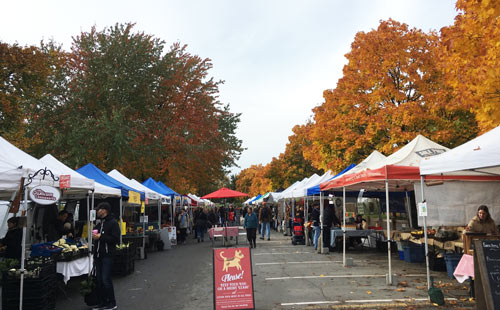7 reasons why buying local is better (year round)

As Cyber Monday and the Black Friday weekend chaos comes to a close, I’m reflecting on a weekend where I practiced Buy Nothing Day on Friday, and bought things only from local makers and small businesses since then. My year-round preference is to shop local, but I’m writing about this now because it’s the start of BC Buy Local week.
As you plan your holiday shopping — or any shopping — keep local businesses top of mind. Here’s why:
1) Buying local keeps more money in the local economy. According to LOCO BC‘s 2013 stats, for every $100 spent at a local business, $46 goes back into the local economy. That’s 2.6x more than at multi-national chains ($18 out of every $100).
2) Supporting local businesses also translates into more jobs for locals. In fact, “a 1% increase in BC consumer spending creates 3100 jobs and $94 million in annual wages to BC workers” (LOCO BC). Those wages in turn recirculate if spent locally.
3) Supporting local businesses supports a network: local businesses tend to buy from other locals, including producers, services providers and credit unions/banks. According to LOCO, local businesses also give five times more per dollar of revenue to charities in their communities.
4) Local businesses are more personal. As a repeat customer at several local shops, the owners and staff know my preferences, buying history and sometimes my name — and I know theirs. (“How was your trip?” asked Maria who co-owns the deli, several days after I told her about weekend plans.) The relationship makes shopping there a pleasant experience, in addition to the more relaxed atmosphere. This is one way of building a vibrant and trusting community.
5) Belonging and pride of place are enhanced when a neighbourhood has the conviviality of public life. Local businesses are a great way to meet other locals and newcomers and build social connection. They also contribute to a more meaningful experience outside…
6) Local small businesses contribute to a vibrant streetscape. Architect Jan Gehl, interviewed in Charles Montgomery’s Happy City, says: “… what attracts people to stop and linger and look, will invariably be other people. Activity in human life is the greatest attraction in cities. … If you make more space for people, you get more people and of course then you get public life” (pp150-151). And Montgomery writes that “studies of seniors living in Montreal found that elderly people who lived on blocks that had front porches and stoops actually had stronger legs and hands than those living on more barren blocks.” The latter could include streets with big-box stores. “Meanwhile, those who could actually walk to shops and services were more likely to volunteer, visit other people, and stay active” (163). I can’t think of a better reason to make sure we keep small businesses healthy.
7) Local businesses offer another great social advantage: meeting the makers. Farmers markets and craft fairs are great examples of this, but there are others with brick-and-mortar shops such as Melk art & design on Clark Dr., which I visited during the East Side Culture Crawl, and Under the Umbrella on Lonsdale Ave. where the makers take turns tending the co-operative shop. This offers opportunities to hear the story behind objects and learn where materials come from. (The handle on my razor is made from cherry wood found in West Vancouver.) And there are plenty of places to find higher-quality and sustainably-made goods among the locally-run shops. My client Second Nature Home Boutique stocks plenty of goods by local makers year-round.
If you’re a local business owner or employee, join me at LOCO BC’s next monthly mixer, Tuesday December 6th on Granville Island.
Find a local business using LOCO BC’s member map/list and join the conversation on social media by tagging your Instagram posts with #BCbuylocal. BC Buy Local week runs through December 4th.
